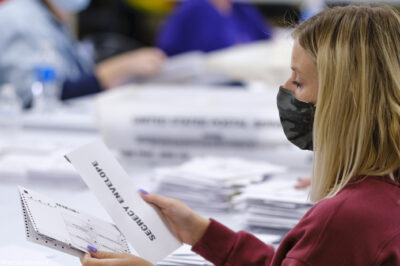Supreme Court to Determine Future of Equal Protection and Voting Rights Act Claims in Louisiana Case
WASHINGTON โThe U.S. Supreme Court today agreed to review the case of Robinson v. Callais, which could determine how congressional maps are drawn in Louisiana.
The court will now consider whether Louisiana violated the U.S. Constitutionโs Equal Protection Clause when the state legislature redrew Louisianaโs congressional map in January 2024, after a federal court found the stateโs 2022 map violated the Voting Rights Act (VRA). The court may also determine how much latitude state lawmakers have in considering politics or other legislative preferences when they draw districts to comply with the VRA.
โWe look forward to continuing to defend the rights of Black voters to elect their candidates of choice,โ said Stuart Naifeh, redistricting manager for the Legal Defense Fund (LDF). โJust in 2023, the Supreme Court recognized the ongoing vitality and necessity of the Voting Rights Act to protect voters of color from dilution of their votes in state redistricting decisions. Black voters have an unprecedented opportunity to make their voices heard in this yearโs congressional elections because multiple federal courts, in our Robinson v. Landry litigation, applied that ruling and invalidated the stateโs 2022 congressional map. Federal law requires Louisiana to have a fair map that reflects the power and voice of the stateโs Black communities. The state recognized as much when it adopted a new map with a second majority-Black district in January. Now the Supreme Court must do the same.โ
While oral arguments will not occur for several months, Louisiana voters will be able to cast their ballots this November under the 2024 map, known as SB8, which has two majority-Black districts.
SB8 was drawn in direct response to a separate lawsuit, Robinson v. Ardoin, where a district court judge found that the stateโs 2022 map, which included only one majority-Black district, likely violated Section 2 of the VRA. The plaintiffs in that case are the NAACP Louisiana State Conference and Power Coalition for Equity and Justice, as well as nine individual Black voters: Dr. Press Robinson, Edgar Cage, Dr. Dorothy Nairne, Bishop Edwin Renรฉ Soulรฉ, Dr. Alice Washington, Reverend Clee Earnest Lowe, Commissioner Davante Lewis, Martha Davis, and Ambrose Sims.
Shortly after SB8 was passed, a group of self-described โnon-African American votersโ challenged the map as a racial gerrymander in violation of the Fourteenth Amendment in Callais v. Landry. The same Robinson litigants intervened in the case to protect their victory in Robinson and the new voting opportunities SB8 provided to Black Louisianans around the state.
The Supreme Courtโs decision comes after a divided panel of three federal judges overturned SB8 as an improper racial gerrymander in April. That decision was put on hold temporarily in May, allowing SB8 to go into effect, while the court considered whether to take up the case. Todayโs action means the temporary hold will continue while the Court considers the case.
โWe will continue our fight for fair representation as long as it takes,โ said Michael McClanahan, president of the NAACP Louisiana State Conference. โFor generations, Black Louisianians have fought to have our voices heard in our political process. We look forward to having our voices heard again as we continue this case. We remain steadfast and unmovable.โ
โThis year, Black voters finally feel hope that their voices will be heard equally at the ballot box because we achieved a fair map,โ said Ashley Shelton, president and CEO of Power Coalition for Equity and Justice. โWe canโt turn back after this election. Our communities need the confidence that they will be respected in our political process, protected by our laws, and treated fairly by our courts. We will continue to fight to make sure that Black voters achieve a lasting map that continues to embody the principles of fairness and equity for the remainder of this decade โ and beyond.โ
โWe remain undeterred in our fight for fair elections for Black voters in Louisiana,โ said Nora Ahmed, legal director, ภฯฐฤรลฟชฝฑฝแน๛ of Louisiana. โThe law is clear. The current map is fair and constitutional. We have every reason to believe the Supreme Court will keep it in place.โ
โThe Robinson Intervenors have stood firm for the right of Louisiana voters to elect representatives without their voting power being diluted,โ said Tracie Washington of the Louisiana Justice Institute. โThey intervened in this Callais case to ensure the fair Congressional map passed this year remains in effect, because it does not constitute an unlawful gerrymander, and maintains decades of VRA and Constitution precedence.โ
โThe legislature enacted a map with two majority-Black congressional districts after numerous federal courts indicated it was required by the Voting Rights Act,โ said Sarah Brannon, deputy director of the ภฯฐฤรลฟชฝฑฝแน๛โs Voting Rights Project. โWe believe the Supreme Court will find this map constitutional.โ
โLouisiana votersโ voices deserve to be heard in the courtroom and at the ballot box. This decision presents an opportunity to ensure fair representation in Louisiana,โ said Alora Thomas, senior counsel, Harvard Election Law Clinic.
The Robinson intervenor-defendants are represented by the Legal Defense Fund, ภฯฐฤรลฟชฝฑฝแน๛, ภฯฐฤรลฟชฝฑฝแน๛ of Louisiana, Harvard Election Law Clinic, Louisiana Justice Institute, Louisiana attorney John Adcock, and Paul, Weiss, Rifkind, Wharton & Garrison LLP.



